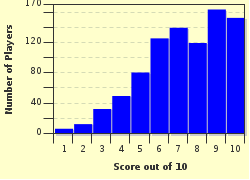Quiz Answer Key and Fun Facts
1. Our first word comes from Ireland via England. Named after a landowner in 19th century Ireland against whom non-coercive action was taken to protest against the exploitation of tenants, it could be described in French as "pour s'abstenir collectivement". What adaptation of an English word do the French use instead?
2. Our next word is of Italian origin, describing a form of graphical self-expression employed by US soldiers on tour, Parisian counter-revolutionaries and hip hop artists and stretching all the way from cave dwellers to Banksy. A long-winded Frenchman might describe it as "slogans jet-peints sur un mur" but the Académie accepts that the more succinct Italian word is better. Which word?
3. Although the Académie lists it as coming to the French language from Turkish, the original word is Arabic. However, Turkey is the country with which the foodstuff that the French might have called, "viande coupée en tranches d'une broche et placée dans un pain de pita avec de la salade", is most associated. However, that would make most shop signs far too long, so what Turkish word is used instead?
4. The French might call such a person "un admirateur enthousiaste" but why bother when the Spanish have already coined a word that sums up the concept of the ardent admirer in a neat one word package. What is that word?
5. Usually found alongside the word "running" in English, this original Malay word was used to describe a sudden frenetic burst of murderous violence after taking opium. It has a more softened meaning since the English language adopted it from the Portuguese word. This could be described in French as "pour courir autour dans une frénésie" but what Malay word do the Académie suggest is more effective?
6. The French may take little Xavier and petite Juliette to "un jour des expositions de l'équitation" where they could display their exquisite husbandry and handling of the equine beasts. However, that phrase hardly trips off the tongue. So, instead, the French have humbly borrowed a word that the English adapted from the Urdu language. In its original usage the Indians used it to describe a place where sporting events took place. What is that word?
7. Originally a noun meaning a replacement or substitute, its use as a branding upon low quality foodstuffs given to prisoners of war in Germany brought it to other languages as an adjective. In French it could be described as "de la qualité incertaine ou inférieure". What is the German word that the French use in its place?
8. Our next word is adapted from an original Chinese word and describes a particular gardening technique. Now most commonly associated with Japan, the full explanation in French, "petits arbustes qui ressemblent aux arbres, cultivés dans des pots," is somewhat lacking in brevity. What Japanese word does the Académie think works better?
9. If you are French you most probably have mayo with your "frites" but in the anglophone world you are more likely to have a condiment which takes its name from the Malay word for fish sauce. The French might have called it "sauce tomate" or "sauce rouge" but instead they use what word, borrowed from English?
10. Our final word is one that has been applied to people as varied as the founder of the Sikh faith and your local IT specialist. Though it could have entered the French language in the form, "un guide intellectuel ou spirituel", instead the Académie have adopted an adaptation of a Sanskrit word, meaning one who has great knowledge. What word, that the "Dictionnaire" lists as coming from the Hindi language, is considered the mot juste?
Source: Author
Snowman
This quiz was reviewed by FunTrivia editor
stedman before going online.
Any errors found in FunTrivia content are routinely corrected through our feedback system.

